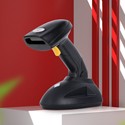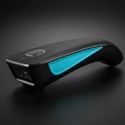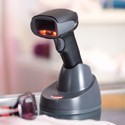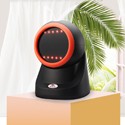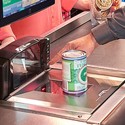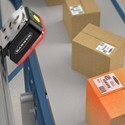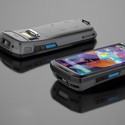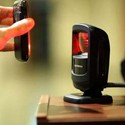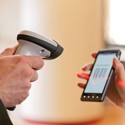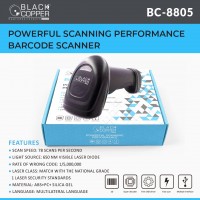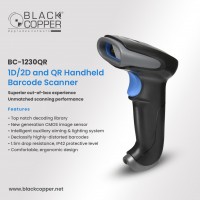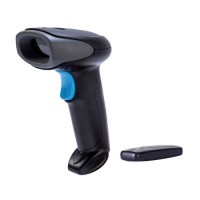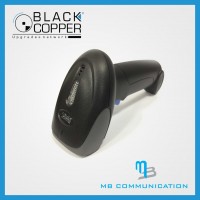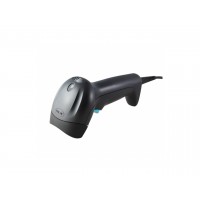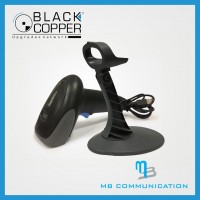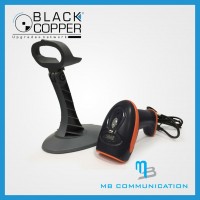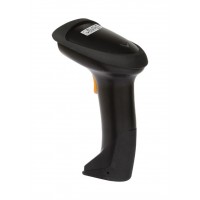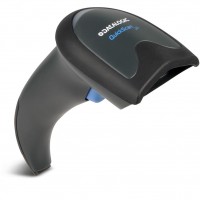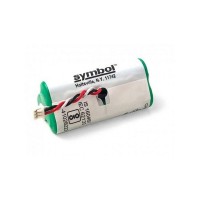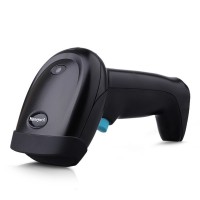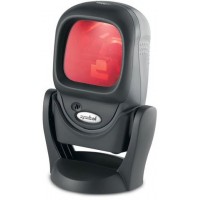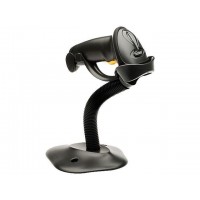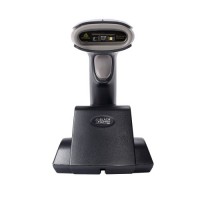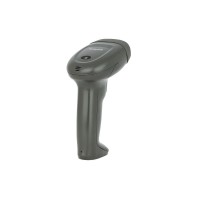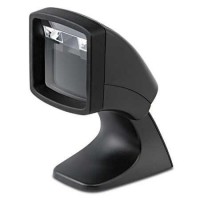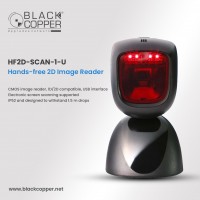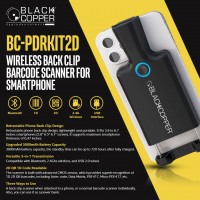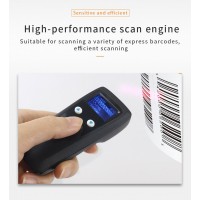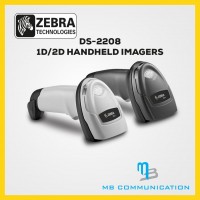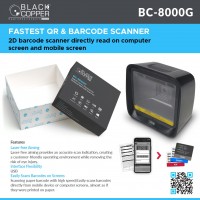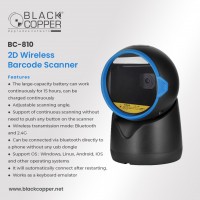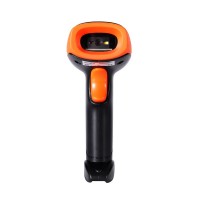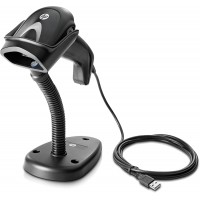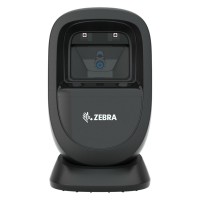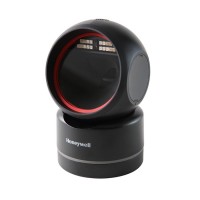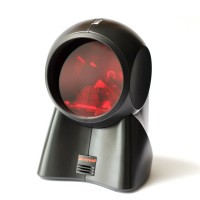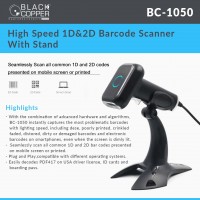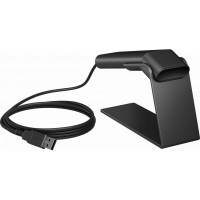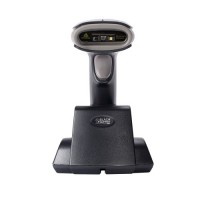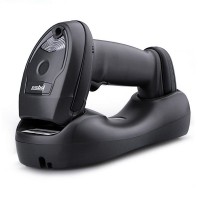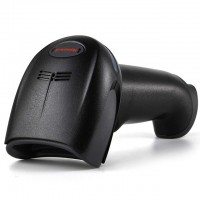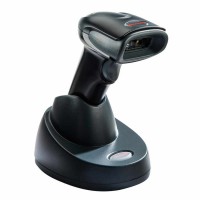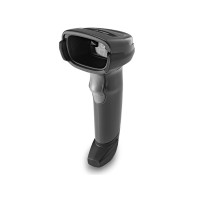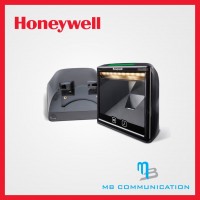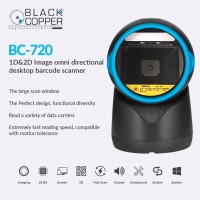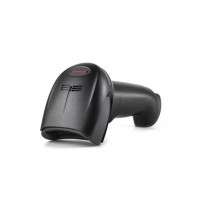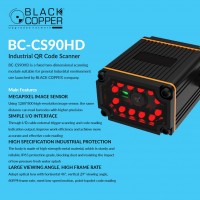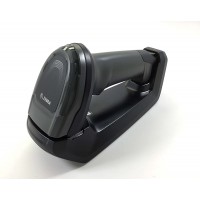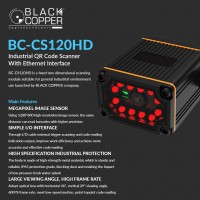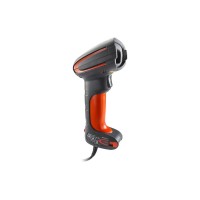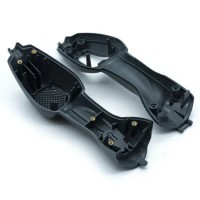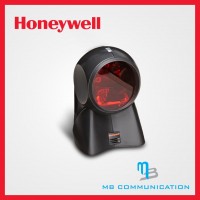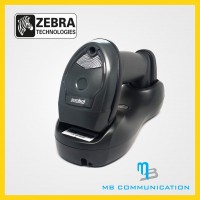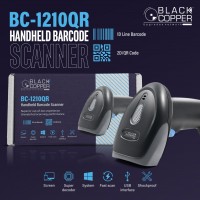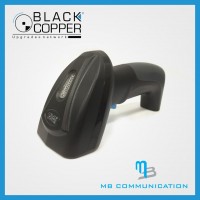No products
Barcode Scanner
New products
-

BlackCopper BC-EGP-10G015-Z
Transform Your Business with BlackCopper BC-EGP-10G015-Z Dual Screen POS...
Rs 0
Catalog
Barcode Scanners: Your Guide to Efficient Inventory Management
Barcode scanners have become an essential tool for businesses of all sizes, streamlining inventory management, point-of-sale transactions, and data collection. Whether you're running a small shop, a large warehouse, or anything in between, choosing the right barcode scanner can signi...
Barcode Scanners: Your Guide to Efficient Inventory Management
Barcode scanners have become an essential tool for businesses of all sizes, streamlining inventory management, point-of-sale transactions, and data collection. Whether you're running a small shop, a large warehouse, or anything in between, choosing the right barcode scanner can significantly boost your efficiency and accuracy. This comprehensive guide will walk you through the different types of barcode scanners, factors to consider when choosing one, and a breakdown of leading brands like BlackCopper, Zebra, HP, Honeywell, Mindeo, and Symbol.
Types of Barcode Scanners
Barcode scanners are broadly classified into two main categories:
-
Handheld Scanners: These are portable devices ideal for scanning items in various locations. They come in two main types:
-
Laser Scanners: These use a laser beam to read barcodes and are often preferred for their affordability and reliability.
-
Imaging Scanners: These capture an image of the barcode, allowing them to read damaged or poorly printed barcodes. They also offer versatility in reading different barcode types.
-
-
Fixed Mount Scanners: These are stationary devices designed for high-volume scanning applications. They are typically integrated into POS systems, conveyor belts, or other stationary equipment.
Factors to Consider When Choosing a Barcode Scanner
-
Barcode Type: Different barcodes require different scanning technologies. Determine the types of barcodes you need to read.
-
Scanning Distance: Consider the typical distance between the scanner and the barcode. Some scanners are designed for close-range scanning, while others can read barcodes from a distance.
-
Scanning Speed: The scanning speed can impact productivity, especially in high-volume environments.
-
Durability: Choose a scanner that can withstand the rigors of your working environment, particularly if it will be used in harsh conditions.
-
Connectivity: Scanners can connect to computers via USB, Bluetooth, or wireless networks. Select a connection option that suits your needs.
-
Battery Life: For handheld scanners, battery life is an important consideration. Look for scanners with long battery life and quick charging capabilities.
-
Budget: Barcode scanners range in price depending on features and brand. Set a budget and research scanners that fit within your range.
Leading Barcode Scanner Brands
-
BlackCopper: BlackCopper offers a wide range of barcode scanners known for their reliability and affordability. They cater to various industries, from retail to manufacturing.
-
Zebra: Zebra is a renowned brand known for its high-quality, rugged barcode scanners. Their devices are ideal for demanding environments and offer advanced features.
-
HP: HP offers a range of barcode scanners that balance affordability with quality. Their products are suitable for both small and large businesses.
-
Honeywell: Honeywell specializes in barcode scanners designed for specific industries, such as healthcare and logistics. Their scanners are known for their advanced features and durability.
-
Mindeo: Mindeo is a popular brand known for its cost-effective barcode scanners. Their products are suitable for small businesses and retail environments.
-
Symbol: Symbol is a brand known for its durable and reliable barcode scanners. Their products are designed for high-volume and demanding applications.
Key Considerations for Pakistan
-
Local Availability: Ensure that the chosen barcode scanner brand is readily available in Pakistan with reliable support and warranty services.
-
Power Requirements: Consider the local power supply and choose scanners compatible with the voltage standards.
-
Compliance with Local Regulations: Ensure that the chosen scanner complies with any relevant regulatory standards in Pakistan.
Conclusion
Choosing the right barcode scanner is crucial for efficient inventory management and business operations. By carefully considering factors such as barcode type, scanning distance, and budget, you can find a scanner that meets your specific needs. Explore the offerings from leading brands like BlackCopper, Zebra, HP, Honeywell, Mindeo, and Symbol, keeping in mind the specific needs of your business in Pakistan.
Barcode Scanner There are 106 products.
Subcategories
-
Wireless Barcode Scanner
Wireless Barcode Scanners: Untethered Efficiency for Your Business
Wireless barcode scanners have revolutionized inventory management, allowing for greater mobility and flexibility in various settings. They free you from the constraints of cables, enabling efficient data capture in warehouses, retail stores, and other busy environments. Here's a comprehensive guide to wireless barcode scanners, focusing on two leading brands: BlackCopper and Zebra.
Why Choose Wireless Barcode Scanners?
-
Enhanced Mobility: Scan items from anywhere in your facility without being tethered to a computer or fixed location.
-
Increased Productivity: Workers can scan more efficiently, leading to faster inventory management and order fulfillment.
-
Improved Accuracy: Wireless scanners reduce the risk of data entry errors associated with manual data entry.
-
Flexibility and Convenience: Easily integrate wireless scanners with different systems and devices.
-
Cost Savings: Eliminate the need for expensive cabling infrastructure.
Key Features of Wireless Barcode Scanners
-
Connectivity: Most wireless scanners utilize Bluetooth or Wi-Fi technology for seamless data transfer.
-
Range: The range of the wireless signal determines how far away you can scan from the connected device.
-
Battery Life: Long battery life is crucial for uninterrupted scanning, especially in demanding environments.
-
Durability: Choose a scanner built to withstand the rigors of your workplace, especially if it will be used in harsh conditions.
-
Ergonomics: Consider the scanner's weight and design for comfortable extended use.
Leading Brands for Wireless Barcode Scanners
BlackCopper:
-
Affordability: BlackCopper offers a range of wireless barcode scanners known for their competitive pricing, making them an attractive option for budget-conscious businesses.
-
Reliability: They deliver consistent performance and durability, catering to a wide range of applications.
-
Diverse Range: BlackCopper provides scanners with various features, including different scan ranges, battery life, and connectivity options.
Zebra:
-
Premium Quality: Zebra is renowned for its high-quality, rugged wireless barcode scanners, ideal for demanding environments.
-
Advanced Features: Their scanners often incorporate cutting-edge technology, such as advanced imaging capabilities and robust security features.
-
Industry-Specific Solutions: Zebra offers scanners tailored for specific industries, such as healthcare, manufacturing, and logistics.
Factors to Consider When Choosing a Wireless Barcode Scanner
-
Application: Determine the specific tasks for which the scanner will be used to choose a model with the appropriate features.
-
Budget: Set a budget and compare pricing across different models and brands.
-
Environment: Consider the work environment where the scanner will be used, including temperature, humidity, and potential for drops.
-
Scan Range: Assess the required scan distance and choose a scanner with an adequate wireless range.
-
Battery Life: Prioritize scanners with long battery life and quick charging capabilities to minimize downtime.
Conclusion
Wireless barcode scanners provide unmatched efficiency and flexibility for businesses of all sizes in Pakistan. By carefully considering your specific needs and exploring the offerings from leading brands like BlackCopper and Zebra, you can select a wireless scanner that boosts productivity and optimizes inventory management.
-
-
Bluetooth Barcode...
Bluetooth Barcode Scanners: Your Guide to Efficient Inventory Management
In today's fast-paced business environment, efficient inventory management is crucial for success. Bluetooth barcode scanners have become essential tools for streamlining operations, enhancing accuracy, and saving valuable time. If you're looking to optimize your inventory management processes, understanding the benefits and features of Bluetooth barcode scanners is essential.
What are Bluetooth Barcode Scanners?
Bluetooth barcode scanners are wireless devices that use Bluetooth technology to connect to computers, tablets, or smartphones. They allow you to scan barcodes and instantly transfer data without the need for cables or physical connections. This wireless connectivity provides greater mobility and flexibility for your workforce, enabling them to scan items from any location within range.
Key Features of Bluetooth Barcode Scanners
Modern Bluetooth barcode scanners come with a range of features that cater to different business needs. Here are some essential features to consider:
- Scanning Capabilities: Scanners can handle various barcode types, including 1D, 2D, and QR codes, ensuring compatibility with different products and labels.
- Data Storage: Many scanners have internal memory to store scanned data, enabling offline scanning and data collection even without a direct connection.
- Connectivity Options: Bluetooth scanners can connect to various devices, including computers, laptops, tablets, and smartphones, providing flexibility in data transfer.
- Battery Life: Long-lasting batteries are crucial for extended scanning sessions, ensuring uninterrupted operations. Look for scanners with rechargeable batteries for convenient power management.
- Ergonomics: Comfortable grip and lightweight designs are important for ease of use and reducing operator fatigue, especially for frequent scanning tasks.
Benefits of Using Bluetooth Barcode Scanners
Bluetooth barcode scanners offer numerous benefits for businesses of all sizes. Here are some key advantages:
- Increased Efficiency: Wireless connectivity eliminates the need for cables, allowing for faster and more efficient scanning processes.
- Enhanced Accuracy: Barcode scanning technology significantly reduces human error, resulting in accurate data collection and inventory management.
- Improved Productivity: Workers can scan items from anywhere within range, optimizing their time and improving overall productivity.
- Real-Time Data: Instant data transfer provides real-time inventory updates, giving businesses better insights into stock levels and demand.
- Cost Savings: Streamlined inventory management reduces errors, stockouts, and overstocking, leading to significant cost savings.
- Enhanced Customer Service: Accurate inventory data improves order fulfillment speed and reduces wait times, leading to enhanced customer satisfaction.
Applications of Bluetooth Barcode Scanners
Bluetooth barcode scanners have numerous applications across various industries. Some common uses include:
- Inventory Management: Accurate tracking of stock levels, receiving, and shipping processes.
- Retail Operations: Point-of-sale (POS) systems, customer loyalty programs, and inventory control.
- Warehousing and Logistics: Tracking goods movement, optimizing picking and packing processes.
- Healthcare: Patient identification, medication management, and inventory control in hospitals and clinics.
- Manufacturing: Production line tracking, quality control, and asset management.
- Asset Tracking: Monitoring equipment, tools, and other assets within a facility.
Choosing the Right Bluetooth Barcode Scanner
Selecting the best Bluetooth barcode scanner for your needs depends on factors such as:
- Scanning Range: Consider the distance between the scanner and the device it will connect to.
- Barcode Types: Ensure the scanner can read the types of barcodes you use.
- Data Storage Capacity: Determine the amount of data you need to store offline.
- Battery Life: Assess the battery life based on your scanning frequency and duration.
- Ergonomics: Choose a scanner that is comfortable to use for extended periods.
Conclusion
Bluetooth barcode scanners offer a powerful solution for businesses looking to improve inventory management and streamline operations. By leveraging wireless connectivity, advanced scanning capabilities, and real-time data transfer, these devices can significantly enhance efficiency, accuracy, and productivity. To ensure you choose the right scanner for your specific needs, consider the factors mentioned above and consult with reputable providers like MB Communication, who can provide expert guidance and help you find the ideal solution for your business.
-
Portable Barcode Scanners
Portable Barcode Scanners: The Ultimate Guide for Efficiency and Accuracy
In today's fast-paced world, efficiency and accuracy are paramount. Businesses across various industries rely heavily on barcode technology for seamless operations, from inventory management to point-of-sale transactions. Portable barcode scanners have revolutionized this process, offering unparalleled mobility and flexibility. If you're looking to streamline your operations, enhance productivity, and minimize errors, understanding the ins and outs of portable barcode scanners is essential.
What are Portable Barcode Scanners?
Portable barcode scanners are handheld devices that read barcodes and convert the data into digital information. They are designed to be compact, lightweight, and ergonomic, making them ideal for use in various environments, including warehouses, retail stores, libraries, healthcare facilities, and more.
Types of Portable Barcode Scanners
There are several types of portable barcode scanners available, each with its unique features and capabilities:
- Laser Scanners: These scanners use a laser beam to read barcodes. They are known for their reliability, speed, and ability to read barcodes at a distance.
- CCD Scanners: CCD (Charge-Coupled Device) scanners use an array of sensors to capture barcode data. They are ideal for scanning barcodes in close proximity.
- Imager Scanners: Imager scanners capture an image of the barcode and then use software to decode it. They are highly versatile and can read a wide variety of barcode types, including damaged or distorted barcodes.
- 2D Scanners: These scanners can read both 1D and 2D barcodes, including QR codes and Data Matrix codes. They are increasingly popular due to their ability to store a large amount of data.
Benefits of Using Portable Barcode Scanners
Implementing portable barcode scanners offers a multitude of benefits for businesses:
- Enhanced Efficiency: Portable scanners eliminate manual data entry, significantly speeding up tasks like inventory management, check-in/check-out, and order fulfillment.
- Improved Accuracy: Barcode scanning minimizes human error, resulting in accurate data capture and reduced mistakes.
- Increased Productivity: By streamlining processes and eliminating manual tasks, portable scanners free up employees to focus on more strategic activities.
- Real-Time Data: Portable scanners provide real-time data, enabling businesses to make informed decisions and track performance in real-time.
- Cost Savings: By automating tasks and reducing errors, portable barcode scanners can lead to significant cost savings in the long run.
- Improved Customer Service: Faster and more efficient checkout processes lead to increased customer satisfaction.
- Enhanced Inventory Management: Accurate inventory tracking helps businesses optimize stock levels, reduce waste, and avoid stockouts.
Choosing the Right Portable Barcode Scanner
Selecting the right portable barcode scanner depends on your specific needs and requirements. Consider the following factors:
- Barcode Types: Determine the types of barcodes you need to scan.
- Scanning Distance: Consider the distance at which you need to scan barcodes.
- Connectivity Options: Choose a scanner with connectivity options that suit your business needs (e.g., Bluetooth, USB, Wi-Fi).
- Durability: Select a scanner designed to withstand the rigors of your operating environment.
- Ergonomics: Ensure the scanner is comfortable to hold and use for extended periods.
- Battery Life: Consider the battery life of the scanner, especially if you need to use it for long hours.
- Software Compatibility: Ensure the scanner is compatible with your existing software systems.
MB Communication: Your Partner in Barcode Solutions
MB Communication is a leading provider of innovative communication and technology solutions. We understand the importance of efficiency and accuracy in today's business world and offer a wide range of portable barcode scanners to meet your specific requirements.
Contact us today to learn more about our barcode scanner solutions and how we can help your business achieve greater productivity and efficiency.
Note: While MB Communication is mentioned as a provider, the content does not include email addresses, website URLs, or phone numbers as per the instructions.
-
Hand-Held Barcode...
Hand-Held Barcode Scanners: A Comprehensive Guide
In today's fast-paced world, efficiency and accuracy are paramount. Hand-held barcode scanners have revolutionized the way businesses operate, streamlining operations and enhancing productivity. From retail stores to warehouses, these devices have become indispensable tools, enabling businesses to manage inventory, track shipments, and process transactions with speed and precision.
Whether you're a small business owner or a large enterprise, understanding the different types of hand-held barcode scanners and their features is crucial for making an informed decision. In this comprehensive guide, we'll delve into the world of hand-held barcode scanners, exploring their types, functionalities, and key considerations for selecting the perfect scanner for your needs.
Types of Hand-Held Barcode Scanners
Hand-held barcode scanners come in various forms, each designed for specific applications and environments. Here's a breakdown of the most common types:
1. Laser Scanners
Laser scanners utilize a red laser beam to read barcodes. They are known for their affordability and reliability, making them suitable for general-purpose scanning applications. Laser scanners are typically used in retail stores, libraries, and warehouses for inventory management and point-of-sale transactions.
2. Linear Imager Scanners
Linear imager scanners use a line of light to read barcodes. They offer a wider scan area and faster scanning speeds compared to laser scanners. Linear imager scanners are ideal for applications where barcodes may be presented at various angles, such as in retail stores and logistics centers.
3. 2D Scanners
2D scanners are capable of reading both 1D and 2D barcodes, including QR codes and Data Matrix codes. They provide high-resolution scanning and can handle complex codes printed on various surfaces. 2D scanners are widely used in healthcare, manufacturing, and logistics for tracking assets, managing patient records, and automating processes.
4. Area-Imaging Scanners
Area-imaging scanners, also known as "area imagers," capture images of barcodes using a sensor. They offer high-speed scanning and can read barcodes from a wide range of distances and angles. Area-imaging scanners are commonly used in applications that require rapid and reliable barcode capture, such as in e-commerce fulfillment centers and package delivery services.
Key Features of Hand-Held Barcode Scanners
Beyond their scanning capabilities, hand-held barcode scanners offer a range of features that enhance their functionality and user experience:
1. Connectivity
Barcode scanners can connect to various devices and systems, including computers, smartphones, tablets, and POS systems. Common connectivity options include USB, Bluetooth, Wi-Fi, and Ethernet.
2. Data Storage
Some barcode scanners feature built-in memory for storing scanned data. This allows for offline scanning and data collection, which can be transferred to a computer or server at a later time.
3. Battery Life
Battery life is a crucial factor for hand-held barcode scanners, especially in environments where constant scanning is required. Long-lasting batteries ensure uninterrupted operation throughout the workday.
4. Ergonomics
The ergonomic design of a scanner is essential for user comfort and reducing fatigue, especially during extended scanning sessions. Features such as adjustable grips, lightweight construction, and balanced weight distribution contribute to a comfortable user experience.
5. Software Integration
Barcode scanners can integrate with existing software applications to streamline processes. Software integration allows for data synchronization, inventory management, and other functionalities.
Top Hand-Held Barcode Scanner Brands
Several reputable brands manufacture high-quality hand-held barcode scanners. Here are some of the leading names in the industry:
1. BlackCopper
BlackCopper is known for its durable and reliable barcode scanners, offering a wide range of models to meet various needs. Their scanners are designed for demanding environments and are trusted by businesses across different industries.
2. Symbol
Symbol is a leading provider of data capture solutions, including hand-held barcode scanners. Their scanners are renowned for their advanced features, high performance, and rugged construction.
3. Honeywell
Honeywell offers a comprehensive portfolio of barcode scanners, ranging from basic models to advanced scanners with integrated functionalities. Their scanners are known for their ease of use and compatibility with a variety of applications.
4. Zebra
Zebra is a global leader in enterprise mobility solutions, including hand-held barcode scanners. Their scanners are designed for high-volume scanning and are widely used in retail, warehousing, and logistics environments.
Choosing the Right Hand-Held Barcode Scanner
Selecting the appropriate hand-held barcode scanner involves considering several factors:
1. Application
The specific application will determine the type of barcode scanner required. For example, a retail store might need a linear imager scanner for point-of-sale transactions, while a warehouse might require a 2D scanner for inventory management.
2. Scanning Environment
The environment where the scanner will be used plays a crucial role. Factors like lighting conditions, distance to barcodes, and potential for drops or spills should be considered when choosing a scanner.
3. Budget
Barcode scanners come in various price ranges. It's important to set a budget and choose a scanner that offers the necessary features within your price point.
4. Connectivity
The scanner's connectivity options must be compatible with the devices and systems it will be used with.
5. Data Storage
If offline scanning or data collection is required, a scanner with built-in memory is essential.
6. Battery Life
Consider the scanner's battery life and whether it meets the demands of the application.
7. Ergonomics
Choose a scanner with an ergonomic design that promotes user comfort and reduces fatigue.
8. Software Integration
Ensure that the scanner is compatible with existing software applications for seamless integration.
Benefits of Hand-Held Barcode Scanners
Hand-held barcode scanners offer numerous benefits to businesses, including:
1. Increased Efficiency
Barcode scanners automate data capture, reducing manual input and errors. This streamlines processes, allowing for faster transactions, improved inventory management, and increased overall efficiency.
2. Improved Accuracy
Barcode scanners eliminate human error associated with manual data entry. Accurate data capture leads to better inventory management, reduced stockouts, and improved customer satisfaction.
3. Enhanced Productivity
By speeding up processes and reducing errors, barcode scanners boost productivity. Employees can process more transactions, manage inventory more effectively, and focus on other tasks.
4. Reduced Costs
Barcode scanners can help reduce costs by improving efficiency, minimizing waste, and reducing errors. Accurate inventory management leads to lower stockouts and less need for expedited orders.
5. Enhanced Security
Barcode scanners can be used to track assets, manage inventory, and control access to sensitive areas. This enhances security and reduces the risk of theft or loss.
6. Improved Customer Service
Faster and more accurate checkout processes lead to shorter wait times for customers, resulting in improved customer satisfaction.
7. Real-Time Data
Barcode scanners provide real-time data, allowing businesses to track inventory levels, monitor sales trends, and make informed decisions based on up-to-date information.
MB Communication: Your Trusted Partner for Barcode Scanning Solutions
MB Communication is a leading provider of barcode scanning solutions, offering a wide range of products and services to meet your specific needs. With our expertise in barcode technology and commitment to customer satisfaction, we can help you find the perfect hand-held barcode scanner for your business.
Contact us today to learn more about our barcode scanning solutions and how we can help you enhance your operations and achieve your business goals.
By incorporating these strategies and focusing on valuable content, you can create compelling and informative content that ranks highly in search engines and engages your audience. Remember to adapt this content to your specific brand and audience, and always strive to provide high-quality information that adds value to your readers.
-
Desktop Barcode Scanners
Desktop Barcode Scanners: A Comprehensive Guide
Desktop barcode scanners are essential tools for businesses of all sizes, streamlining operations and boosting efficiency. From retail stores to warehouses, these scanners enable quick and accurate data entry, minimizing errors and saving valuable time. This comprehensive guide will delve into the world of desktop barcode scanners, exploring their types, features, benefits, and how to choose the right one for your needs.
Types of Desktop Barcode Scanners
Desktop barcode scanners come in various configurations, each catering to specific application requirements. The most common types include:
- USB Scanners: These scanners connect directly to your computer via a USB port, offering a simple and reliable connection.
- Wireless Scanners: Offering greater flexibility, wireless scanners connect via Bluetooth or Wi-Fi, allowing for movement and scanning without physical cables.
- Presentation Scanners: Designed for presentations and demos, these scanners have a built-in stand and a large scanning area, ideal for displaying barcodes to a group.
- Multi-Interface Scanners: These versatile scanners support multiple connection options, including USB, Bluetooth, and RS-232, providing flexibility for different environments.
Key Features to Consider
When selecting a desktop barcode scanner, consider the following features to ensure optimal performance and suitability for your specific needs:
- Scanning Technology: Laser scanners are cost-effective and reliable, while imagers are more versatile and can read a wider range of barcodes, including 2D codes.
- Scanning Range: This refers to the maximum distance a scanner can read a barcode accurately. Shorter ranges are suitable for close-up scanning, while longer ranges accommodate scanning from a distance.
- Scanning Speed: Faster scanning speeds improve efficiency, particularly in high-volume applications. Consider the average scanning frequency to determine the required speed.
- Durability: Scanners used in demanding environments require greater durability. Look for ruggedized models with impact resistance and IP ratings for water and dust resistance.
- Connectivity Options: Choose the connection type that aligns with your existing infrastructure. USB, Bluetooth, and Wi-Fi are common options, each with its advantages.
- Software Compatibility: Ensure the scanner is compatible with your existing software applications and operating system.
Benefits of Desktop Barcode Scanners
Implementing desktop barcode scanners offers numerous advantages for businesses across industries:
- Increased Accuracy: Scanners eliminate manual data entry errors, improving accuracy and minimizing data inconsistencies.
- Enhanced Efficiency: Fast and efficient scanning speeds streamline processes, saving time and improving productivity.
- Reduced Costs: Automation through barcode scanning minimizes manual labor and reduces operational costs.
- Improved Inventory Management: Accurate tracking of inventory levels helps optimize stock management and minimize stockouts.
- Streamlined Order Fulfillment: Scanners facilitate quick and efficient order processing, leading to faster delivery times and increased customer satisfaction.
- Enhanced Security: Barcode scanning can be used for access control, asset tracking, and product authentication, enhancing security measures.
Choosing the Right Desktop Barcode Scanner
Selecting the ideal desktop barcode scanner involves considering your specific requirements and application environment. Here are some key factors to guide your decision:
- Industry: The industry and specific application will dictate the scanner's features and capabilities.
- Scanning Volume: High-volume applications require fast and durable scanners capable of handling frequent scanning.
- Barcode Types: Determine the types of barcodes you need to scan, as different scanners have varying capabilities.
- Budget: Set a realistic budget and explore scanners that offer a balance between features and price.
Top Desktop Barcode Scanner Brands
Several reputable brands offer high-quality desktop barcode scanners. Some of the leading brands include:
- Honeywell: Known for their rugged and reliable scanners, Honeywell offers a wide range of options for different industries.
- HP: HP provides scanners with advanced features and competitive pricing, catering to both small and large businesses.
- Datalogic: Datalogic scanners are renowned for their accuracy and speed, ideal for high-volume scanning environments.
- Symbol: Symbol offers durable and versatile scanners, particularly for demanding applications like warehouse management.
- Mindeo: Mindeo focuses on providing cost-effective scanners with reliable performance for various applications.
- BlackCopper: A trusted brand known for its innovative and reliable desktop barcode scanners, offering a wide selection to meet diverse needs.
- Hikvision: Hikvision provides high-quality scanners with advanced features and competitive pricing, ideal for businesses seeking comprehensive solutions.
MB Communication: A Trusted Partner for Barcode Scanning Solutions
MB Communication is a leading provider of barcode scanning solutions, offering a comprehensive range of products and services to meet the needs of businesses across industries. They offer expert guidance, installation, and support to ensure seamless integration of barcode scanners into your operations.
Conclusion
Desktop barcode scanners are indispensable tools for businesses looking to streamline processes, improve accuracy, and enhance efficiency. By understanding the different types, features, and benefits of these scanners, you can choose the right model to optimize your operations and unlock the potential for increased productivity and cost savings.
-
In-Counter Barcode...
In-Counter Barcode Scanners: Revolutionizing Retail Efficiency
In the fast-paced world of retail, efficiency is paramount. Customers expect quick and seamless checkout experiences, and retailers are constantly seeking ways to streamline their operations. Enter in-counter barcode scanners, a revolutionary technology transforming the retail landscape.
Why In-Counter Barcode Scanners Are Essential
- Enhanced Checkout Speed: In-counter scanners eliminate the need for manual data entry, significantly reducing checkout time. Customers can breeze through the checkout line, leading to increased satisfaction and reduced queue lengths.
- Improved Accuracy: Unlike manual data entry, which is prone to errors, in-counter scanners provide highly accurate barcode readings. This minimizes the risk of incorrect pricing, inventory discrepancies, and dissatisfied customers.
- Streamlined Inventory Management: By automatically capturing barcode data, in-counter scanners simplify inventory management. Real-time tracking of product movement helps retailers optimize stock levels, reduce waste, and prevent stockouts.
- Enhanced Customer Experience: Faster and more efficient checkout processes translate into a positive customer experience. Customers appreciate the convenience and speed, leading to increased loyalty and repeat business.
Types of In-Counter Barcode Scanners
In-counter barcode scanners come in various configurations to suit different retail environments and needs. Common types include:
- Fixed Scanners: Permanently mounted to the counter, these scanners provide a dedicated and reliable scanning solution.
- Handheld Scanners: Versatile and portable, these scanners can be used for both in-counter and mobile scanning applications.
- Integrated Scanners: These scanners are directly integrated into the Point of Sale (POS) system, providing a seamless and streamlined checkout experience.
The Benefits of Choosing BlackCopper In-Counter Scanners
When it comes to choosing in-counter barcode scanners, BlackCopper stands out as a leading provider of reliable and efficient solutions. BlackCopper's commitment to innovation and quality ensures that their scanners meet the unique demands of modern retail environments.
BlackCopper in-counter scanners offer numerous advantages:
- High-Speed Scanning: BlackCopper scanners deliver lightning-fast barcode reading speeds, minimizing customer wait times and maximizing throughput.
- Unmatched Durability: Built to withstand the rigors of everyday retail use, BlackCopper scanners offer exceptional durability and reliability.
- Seamless Integration: BlackCopper scanners integrate seamlessly with existing POS systems, simplifying implementation and minimizing disruptions.
- Advanced Features: BlackCopper scanners offer a range of advanced features, including omnidirectional scanning, multiple interface options, and flexible mounting configurations.
- Exceptional Customer Support: BlackCopper provides comprehensive customer support, ensuring a smooth transition and ongoing operational excellence.
Optimizing Your Retail Operations with In-Counter Barcode Scanners
In-counter barcode scanners are a powerful tool for retailers looking to enhance operational efficiency, improve customer satisfaction, and gain a competitive edge. By leveraging BlackCopper's advanced scanning solutions, retailers can streamline checkout processes, optimize inventory management, and create a positive customer experience.
Contact MB Communication today to learn more about BlackCopper's in-counter barcode scanner solutions and how they can transform your retail operations.
-
Flat Belt Barcode...
Flat Belt Barcode Scanners: The Ultimate Guide for Efficient Inventory Management
In today's fast-paced world, efficient inventory management is crucial for businesses of all sizes. Flat belt barcode scanners play a vital role in streamlining operations, reducing errors, and optimizing productivity. This comprehensive guide will delve into the intricacies of flat belt barcode scanners, exploring their features, benefits, and applications. Whether you're a seasoned professional or a newcomer to the world of barcode scanning technology, this article will provide valuable insights to enhance your understanding.
What are Flat Belt Barcode Scanners?
Flat belt barcode scanners are specialized devices designed to read barcodes on products that are conveyed along a flat belt. They are widely used in industries where high-volume scanning is required, such as warehousing, distribution centers, and manufacturing plants. The scanning process involves placing the product on the conveyor belt, which carries it past the scanner's reading head. The scanner then captures the barcode data and transmits it to a connected computer or system.
Benefits of Flat Belt Barcode Scanners
Flat belt barcode scanners offer a range of benefits that can significantly enhance your inventory management processes:
- Increased Efficiency: Flat belt scanners automate the barcode reading process, eliminating the need for manual scanning. This leads to faster and more efficient inventory handling.
- Reduced Errors: Automating the scanning process minimizes the risk of human errors, ensuring accurate data capture and inventory tracking.
- Improved Productivity: By streamlining the scanning process, flat belt scanners enable employees to focus on other tasks, boosting overall productivity.
- Real-Time Inventory Visibility: Flat belt scanners provide real-time data on inventory levels, enabling better stock management and minimizing stockouts.
- Enhanced Security: Integrating flat belt scanners with security systems can help prevent inventory theft and unauthorized access.
Applications of Flat Belt Barcode Scanners
Flat belt barcode scanners find applications in a wide array of industries, including:
- Warehousing and Distribution: For receiving, shipping, and inventory management.
- Manufacturing: Tracking production lines and managing raw materials.
- Retail: Point-of-sale (POS) systems and inventory tracking.
- Healthcare: Managing medical supplies and patient records.
- Logistics: Tracking shipments and optimizing delivery routes.
Factors to Consider When Choosing a Flat Belt Barcode Scanner
Selecting the right flat belt barcode scanner is crucial for optimal performance and efficiency. Consider the following factors:
- Scanning Technology: Choose a scanner with appropriate scanning technology, such as laser, linear imager, or 2D imager, based on your specific requirements.
- Scan Speed: Ensure the scanner can handle the required scan volume and meet your throughput needs.
- Reading Range: Select a scanner with a suitable reading range for your application, taking into account the size and placement of barcodes.
- Connectivity: Choose a scanner that supports the required connectivity options, such as USB, Ethernet, or wireless.
- Durability: Consider the scanner's ruggedness and durability, especially if it will be used in harsh environments.
Top Flat Belt Barcode Scanner Brands
Several reputable brands offer high-quality flat belt barcode scanners. Here are a few leading players in the market:
- Zebra: A renowned brand known for its robust and reliable barcode scanners.
- BlackCopper: A rising star in the industry, offering innovative and affordable barcode scanning solutions.
- Honeywell: A trusted provider of barcode scanners with a wide range of features.
- Datalogic: A global leader in barcode reading technology, offering advanced and reliable scanners.
- Denso: A Japanese company known for its high-quality and durable barcode scanners.
By partnering with MB Communication, you can access a comprehensive range of barcode scanner solutions from leading brands like Zebra and BlackCopper. Their expert team can help you choose the right scanner for your specific needs, ensuring optimal performance and efficiency in your inventory management operations.
Conclusion
Flat belt barcode scanners are essential tools for businesses looking to streamline inventory management, reduce errors, and improve overall efficiency. By understanding the features, benefits, and applications of these scanners, you can make informed decisions to optimize your operations. Remember to consider factors such as scanning technology, scan speed, reading range, connectivity, and durability when choosing a flat belt barcode scanner. With the right scanner, you can unlock the potential for greater productivity and success in your business.
-
Android Barcode Scanners
The Ultimate Guide to Android Barcode Scanners: How to Choose the Right One for Your Business
In today's fast-paced business environment, efficiency is key. And when it comes to streamlining your operations, there's no better tool than a reliable barcode scanner. With the widespread adoption of Android devices, Android barcode scanners have become increasingly popular, offering a versatile and cost-effective solution for a wide range of industries.
What are Android Barcode Scanners?
Android barcode scanners are essentially handheld devices that combine the functionality of a traditional barcode scanner with the power of an Android smartphone or tablet. They run on the Android operating system, allowing you to access a variety of barcode scanning apps and integrate them seamlessly with your existing business systems.
The Benefits of Using Android Barcode Scanners
There are numerous advantages to using Android barcode scanners, including:
- Versatility: Android scanners support a wide range of barcode types, including 1D, 2D, and QR codes. They can be used for inventory management, point-of-sale (POS) systems, asset tracking, and more.
- Connectivity: They offer various connectivity options, such as Wi-Fi, Bluetooth, and cellular data, allowing you to easily connect to your network and share data.
- Customization: The Android platform provides a high level of customization, allowing you to tailor the scanner's functionality to your specific needs. You can choose from a wide range of apps and configure them to meet your business requirements.
- Cost-effectiveness: Android scanners are often more affordable than dedicated barcode scanners, making them a budget-friendly option for businesses of all sizes.
Key Features to Consider When Choosing an Android Barcode Scanner
When selecting an Android barcode scanner, consider these essential features:
Scanning Technology
- 1D and 2D Scanning: Determine whether you need to scan 1D barcodes (linear), 2D barcodes (matrix), or both. 2D barcode scanners can read more data and can even decode damaged barcodes.
- Scanning Range: The scanning range determines the distance at which the scanner can successfully read barcodes. Choose a range that suits your environment and needs.
- Scanning Speed: The speed at which the scanner can read barcodes is crucial for efficiency. Opt for a scanner with a fast scanning speed, especially if you need to process a high volume of barcodes.
Hardware
- Processor: The processor's speed and power are crucial for the scanner's overall performance. Choose a device with a powerful processor for smooth operation, especially if you'll be running demanding apps.
- Display Size: The display size should be large enough for clear viewing of data and menus, but not too bulky. Consider the size that best suits your user's needs.
- Battery Life: Battery life is a crucial factor, especially for mobile applications. Look for scanners with long battery life and fast charging capabilities.
Software
- Operating System: Ensure the scanner runs on a compatible version of the Android operating system. Check for updates and support to ensure compatibility with your existing systems.
- Apps and Integrations: Choose a scanner with a wide range of compatible apps and integrations for seamless data collection and management. Look for scanners that support popular barcode scanning apps and integrate with your existing inventory management systems, point-of-sale systems, or other business software.
- Data Security: Ensure the scanner offers robust security features to protect sensitive data. Look for scanners with encryption, password protection, and other security measures.
Popular Android Barcode Scanner Brands
Several leading brands offer a wide range of Android barcode scanners. Some popular options include:
- Zebra Technologies
- Honeywell
- Symbol Technologies (now part of Motorola Solutions)
- Datalogic
- BlackCopper
Tips for Choosing the Right Android Barcode Scanner
To make an informed decision, consider the following:
- Your Business Needs: Determine the specific tasks you need the scanner for, such as inventory management, asset tracking, or point-of-sale operations. This will help you narrow down the features and specifications you need.
- Your Budget: Set a budget and look for scanners that fit within your price range. Consider the long-term benefits and return on investment (ROI).
- User Experience: Choose a scanner with a user-friendly interface, ergonomic design, and intuitive software for easy operation and comfortable use.
- Support and Maintenance: Consider the availability of technical support, warranty, and maintenance services. Look for a reputable brand with reliable customer service.
Conclusion
Android barcode scanners have revolutionized the way businesses manage their operations. They offer a combination of affordability, versatility, and functionality, making them an ideal choice for a wide range of industries. By considering the key features and tips outlined above, you can choose the right Android barcode scanner to streamline your processes, enhance efficiency, and take your business to the next level. If you have any questions or need help choosing the right scanner, MB Communication is here to assist you.
-
2D Barcode Scanners
2D Barcode Scanners: Choosing the Right Scanner for Your Business
In today's fast-paced business environment, efficiency and accuracy are paramount. 2D barcode scanners have become indispensable tools for businesses across various industries, from retail and logistics to healthcare and manufacturing. These advanced scanners offer numerous advantages over traditional 1D scanners, making them a vital investment for organizations looking to streamline operations and enhance productivity.
Understanding 2D Barcode Scanners
2D barcode scanners are designed to read and decode two-dimensional barcodes, which store significantly more information than traditional 1D barcodes. They can capture data from QR codes, Data Matrix codes, and other 2D barcode formats. This ability to handle complex information allows for a wider range of applications and greater data density.
Key Features and Benefits
Enhanced Data Capacity
2D barcodes can store much more information than 1D barcodes, enabling businesses to encode more data, including text, images, and even URLs. This increased data capacity allows for more efficient inventory management, streamlined customer service, and better traceability.
Improved Accuracy and Speed
2D scanners are known for their exceptional accuracy and speed. They can read barcodes from various angles and distances, even in challenging lighting conditions. This efficiency significantly reduces errors and improves overall productivity.
Versatile Applications
2D barcode scanners find applications in numerous industries:
- Retail: Inventory management, point-of-sale transactions, customer loyalty programs, and product tracking.
- Logistics: Package tracking, warehouse management, delivery verification, and shipping label scanning.
- Healthcare: Patient identification, prescription management, medical device tracking, and blood sample labeling.
- Manufacturing: Production line tracking, asset management, quality control, and parts identification.
- Events and Ticketing: Event registration, ticket validation, and attendee tracking.
Types of 2D Barcode Scanners
There are various types of 2D barcode scanners available, each with its unique features and advantages:
- Handheld Scanners: Portable and easy to use, perfect for mobile applications and inventory management.
- Fixed Scanners: Stationary scanners mounted to a counter or workstation, ideal for high-volume applications.
- Wireless Scanners: Offer flexibility and mobility, allowing for data capture from various locations within a facility.
- Integrated Scanners: Built into a larger system, such as a point-of-sale terminal or a mobile device, for seamless integration.
Choosing the Right Scanner
Selecting the appropriate 2D barcode scanner requires careful consideration of your business needs. Here are some factors to consider:
- Application: Determine the specific purpose for the scanner and the types of barcodes you need to read.
- Volume: Estimate the number of scans you will perform daily or weekly.
- Environment: Consider the working environment, including lighting conditions and potential hazards.
- Budget: Set a budget and explore scanners that offer the best value for your investment.
- Connectivity: Choose a scanner with appropriate connectivity options, such as USB, Bluetooth, or Wi-Fi.
Top 2D Barcode Scanner Brands
Several reputable brands offer high-quality 2D barcode scanners. Some popular choices include:
- BlackCopper: Known for its rugged and reliable scanners designed for demanding environments.
- Honeywell: A leading provider of barcode scanners with a wide range of models for various applications.
- Zebra: Offers innovative and versatile scanners, including handheld, fixed, and mobile options.
MB Communication, a prominent provider of technology solutions, can assist you in finding the perfect 2D barcode scanner for your business needs. With their expertise and industry knowledge, they can guide you through the selection process and ensure you choose the right scanner to optimize your operations and achieve your business objectives.
-
Linear Barcode Scanners
Linear Barcode Scanners: A Comprehensive Guide
Linear barcode scanners are essential tools for businesses of all sizes, playing a crucial role in streamlining operations and improving efficiency. They are widely used in various industries, including retail, warehousing, healthcare, and logistics, to scan and read barcodes with precision and speed. This guide will delve into the world of linear barcode scanners, covering their types, features, benefits, and factors to consider when choosing the right scanner for your specific needs.
Understanding Linear Barcode Scanners
Linear barcode scanners, also known as 1D barcode scanners, are designed to read one-dimensional barcodes, which are represented by vertical lines of varying widths. These scanners utilize a laser beam or other light sources to scan the barcode and convert it into readable data.
Types of Linear Barcode Scanners
Linear barcode scanners come in a variety of configurations to cater to diverse applications. Some common types include:
- Handheld Scanners: These portable devices are ideal for mobile scanning and can be easily carried around. They offer versatility and are suitable for various tasks like inventory management, point-of-sale transactions, and shipping.
- Fixed Scanners: Fixed scanners are mounted in a stationary position, commonly used in check-out counters, conveyor belts, and automated systems. They offer high scanning speeds and durability for continuous operation.
- Presentation Scanners: These scanners are designed to be placed on a countertop or other surfaces, where users can simply present the barcode to the scanner for reading.
- Wireless Scanners: Wireless scanners offer freedom of movement and can transmit data wirelessly to a connected computer or device. They are often used in warehouses, factories, and other areas where mobility is essential.
Features of Linear Barcode Scanners
Modern linear barcode scanners boast a range of features that enhance their performance and user experience. These features include:
- Scanning Technology: The scanning technology employed can vary, with options such as laser, LED, and imaging scanners. Each technology offers its own advantages in terms of reading speed, distance, and accuracy.
- Reading Range: The reading range refers to the distance at which the scanner can successfully read a barcode. This can vary depending on the scanner's type and the barcode's quality.
- Decoding Capability: Linear barcode scanners support various barcode symbologies, including EAN, UPC, Code 39, Code 128, and others. Selecting a scanner with compatibility for the required symbologies is crucial.
- Connectivity Options: Scanners can connect to computers and devices via USB, Bluetooth, Wi-Fi, or other interfaces, ensuring seamless integration with existing systems.
- Durability and Robustness: Barcode scanners used in demanding environments require rugged construction to withstand drops, vibrations, and other harsh conditions.
- Ergonomics: Handheld scanners should be ergonomically designed for comfort and ease of use, reducing user fatigue during extended scanning sessions.
Benefits of Linear Barcode Scanners
Linear barcode scanners provide numerous benefits across various industries, including:
- Increased Efficiency: Automated barcode scanning eliminates manual data entry, significantly reducing errors and speeding up processes.
- Improved Accuracy: Barcode scanners offer high accuracy, minimizing the risk of incorrect data and ensuring reliable information for inventory management, tracking, and other applications.
- Real-time Data: Scanners provide real-time data access, enabling businesses to track inventory levels, manage orders, and monitor processes in real-time.
- Cost Savings: Automated scanning reduces labor costs associated with manual data entry, leading to significant cost savings in the long run.
- Enhanced Customer Service: Faster checkout processes and accurate inventory management contribute to improved customer satisfaction and a more seamless shopping experience.
Choosing the Right Linear Barcode Scanner
Selecting the right linear barcode scanner for your needs depends on various factors:
- Application: The intended use of the scanner will determine the required features and specifications.
- Scanning Environment: The environment in which the scanner will be used plays a crucial role. Harsh environments may require rugged and durable scanners.
- Barcode Types: The barcode symbologies that need to be read will dictate the scanner's decoding capabilities.
- Budget: Set a budget and consider the cost of the scanner, including any accessories or software.
- Brand Reputation: Research and choose reputable brands known for quality, reliability, and customer support.
Top Linear Barcode Scanner Brands
Here are some leading brands known for their high-quality linear barcode scanners:
- BlackCopper: BlackCopper stands out with its commitment to innovation and quality. Their scanners offer a balance of performance, features, and affordability, making them suitable for a wide range of applications.
- Datalogic: Datalogic is a well-established brand in the barcode scanning industry, known for its reliable and durable scanners designed for demanding environments.
- Honeywell: Honeywell is another reputable brand offering a diverse selection of linear barcode scanners, including handheld, fixed, and wireless models. Their scanners are renowned for their advanced features and robust performance.
Conclusion
Linear barcode scanners have become indispensable tools for businesses seeking to enhance efficiency, accuracy, and productivity. By understanding the different types, features, and benefits of these scanners, you can make an informed decision when choosing the right one for your specific needs. Remember to consider factors like application, environment, budget, and brand reputation to find the perfect scanner that will streamline your operations and drive business success.
MB Communication is committed to providing businesses with the best barcode scanning solutions. If you have any questions or need assistance in selecting the right scanner for your organization, don't hesitate to contact us. We are here to help you optimize your operations and achieve your business goals.
-
QR Code Scanner
QR Code Scanner: A Comprehensive Guide for BlackCopper & HP Users
Welcome to the world of QR codes, a technology that's revolutionizing how we interact with the digital world. Whether you're a BlackCopper or HP user, understanding QR code scanners is essential in this interconnected age. This guide will delve into the ins and outs of QR code technology, explore the benefits it offers, and provide you with the knowledge to confidently scan QR codes for a seamless digital experience.
What are QR Codes?
QR codes (Quick Response codes) are two-dimensional barcodes that store information in a matrix format. They are easily scannable using a smartphone camera or a dedicated QR code scanner app. QR codes can contain various types of data, including:
- URLs (website addresses)
- Text (contact information, product descriptions)
- Images
- Audio
- Video
- Location data
- Email addresses
- Phone numbers
- Social media links
Why Use QR Code Scanners?
QR code scanners have become increasingly popular due to their numerous benefits. They offer a convenient and efficient way to access information, engage with digital content, and enhance various aspects of our daily lives. Here are some key advantages of using QR code scanners:
- Easy Access to Information: QR codes provide quick and effortless access to websites, documents, and other digital resources. Simply scan the code with your smartphone, and you'll be instantly directed to the desired information.
- Enhanced User Experience: QR codes enhance the user experience by streamlining interactions with digital content. For example, scanning a QR code on a product package can provide access to detailed product information, reviews, and videos.
- Marketing and Advertising: QR codes are a powerful tool for marketing and advertising campaigns. They can be integrated into print materials, product packaging, and social media posts to drive traffic to websites, promotions, and social media pages.
- Contactless Interactions: In today's world, contactless interactions are more important than ever. QR codes enable contactless sharing of information, such as business cards, event details, and payment links.
- Security and Convenience: QR codes can be used to authenticate documents and prevent counterfeiting. They also offer a convenient way to share information securely without the need for typing or copying long strings of text.
How to Scan QR Codes:
Scanning QR codes is a simple process that can be done with a smartphone or a dedicated QR code scanner app. Here's a step-by-step guide:
- Open Your Camera App: Most smartphones have built-in QR code scanners within their camera apps. Simply open your camera and point it at the QR code.
- Use a QR Code Scanner App: If your smartphone doesn't have a built-in QR code scanner, you can download a dedicated QR code scanner app from your app store. Popular options include Google Lens, QR Code Reader, and others.
- Focus on the Code: Ensure your camera or app is focused on the QR code and that the entire code is visible within the frame.
- Scan the Code: Once the camera or app recognizes the QR code, it will automatically scan and process the information contained within.
- Access the Information: After scanning the QR code, you will be directed to the website, document, or other content associated with the code.
QR Code Scanners for BlackCopper and HP Users:
BlackCopper and HP devices are known for their seamless integration with cutting-edge technology. Both brands offer exceptional QR code scanning capabilities, making it easy for users to access information and engage with digital content. Whether you're using a BlackCopper phone, tablet, or laptop or an HP smartphone, tablet, or computer, you can effortlessly scan QR codes using the following methods:
BlackCopper Devices:
BlackCopper devices come equipped with a built-in QR code scanner within the camera app. To scan a QR code:
- Open the camera app on your BlackCopper device.
- Point the camera at the QR code and ensure it's visible within the frame.
- Your BlackCopper device will automatically recognize the QR code and display the information associated with it.
HP Devices:
HP devices, including smartphones and tablets, also have built-in QR code scanners within the camera app. To scan a QR code:
- Open the camera app on your HP device.
- Point the camera at the QR code and make sure it's fully visible within the frame.
- Your HP device will automatically detect the QR code and provide access to the corresponding content.
For HP computers and laptops, you can download a dedicated QR code scanner app from the Microsoft Store or other app stores.
MB Communication: Partnering with You for a Seamless QR Code Experience
MB Communication understands the importance of seamless digital integration. We provide comprehensive solutions that enhance the user experience, including QR code integration for businesses and individuals. Our commitment to innovation and excellence ensures that your QR code needs are met with cutting-edge technology and expert support.
QR code scanners have become an integral part of our digital lives, offering convenience, efficiency, and access to a vast array of information. Whether you're a BlackCopper or HP user, embracing QR code technology empowers you to connect with the digital world effortlessly and seamlessly.
-
Black Copper BC-8805
Black Copper Barcode Scanner BC-8805 enhanced model which has capability to Scan Speed: 78 scans per second Interface Type: USB Optical Resolution: 0.10mm (4mil) PCS0.9 Model 8805 Scan Element Type: Laser color: Black
Rs 3,950In Stock -
Black Copper BC-1230QR
1D/2D and QR Handheld Barcode Scanner Superior out-of-box experienceUnmatched scanning performance
Rs 5,720In Stock -
-
Black Copper BC-1020 Revolve QR
Auto Trigger 1D, 2D and QR Code Scanner ◆ superior performance ◆ The exquisite design, good applicability ◆ The appearance of smooth, comfortable nature ◆ Support RS232/USB, barcode reading fluently
Rs 7,280In Stock -
Honeywell Youjie ZL2200
Honeywell Youjie ZL2200 1D Single-line Laser Handheld Logistics Medical Barcode Scanner About Youjie As a second brand of Honeywell Scanning & Mobility, Youjie targets the rapid growth of mid- to low- markets in automatic data collection industry, providing a better alternative to users who look for easy data collection solutions.
Rs 7,280In Stock -
Black Copper BC-8810-A Revolve
Black Copper BC-8810-A Revolve Auto Trigger ◆ superior performance, Auto scan◆ The exquisite design, good applicability ◆ The appearance of smooth, comfortable nature ◆ Support USB, barcode reading fluently
Rs 7,800In Stock -
Black Copper BC-8850-AR Freedom
Black Copper BC-8850-AR Freedom Auto Trigger ◆ To provide faster, more secure, more simple ◆ Provide a higher speed◆ Provide a higher speed, more secure ◆ Rugged BC8850AR Barcode Scanner◆ USB Interface ◆ Auto Barcode Scan
Rs 9,880In Stock -
Black Copper BC-F1
Bluetooth Barcode Reader Wireless Bluetooth handheld barcode scanner features fast and accurate 1D codes reading(on paper). It is widely used in commercial POS system, supermarkets, warehouses, logistics, libraries, banks, postal service, industrial and manufacturing process management, etc.
Rs 9,880In Stock -
Datalogic QW2100
QuickScan I Lite QW2100 Affordable linear imager with outstanding 1D reading performance
Rs 14,040In Stock -
Symbol Battery LI4278B
Battery Compatible with these wireless barcode scanner LS4278LI4278DS6878
Rs 14,060In Stock -
Honeywell HH360
Honeywell HH360 Youjie Linear-Imaging Scanner Honeywell HH360 excellent linear scanning performance, HH360 provides fast 1D image scanning capability for typical barcodes (up to 23.4 inches (600mm) scanning distance), high density barcodes, or even poor or damaged bar codes with a single device.
Rs 14,300In Stock -
-
Symbol LS2208
Symbol LS2208 Barcode Scanner The Motorola / Symbol LS2208 is designed for continuous usage all day, which significantly reduces downtime and repair costs. It provides accurate, first-time scanning. And LS2208 since it is always ready for the next scan.
Rs 16,640In Stock -
Black Copper BC-F3
BC-F3 1D Handheld Wireless Barcode Scanner With Base ◆ In-store cordless freedom◆ Capture all 1D code◆ Battery can be used for a long time◆ Superior durability and reliability
Rs 18,720In Stock -
Honeywell HH490
GENERAL PURPOSE HANDHELD HH490 Handheld 2D Area-Imaging Scanner HH490 is designed for commercial environments requiring high speed 1D/2D scanning operations. The imager is able to read bar codes rapidly and continuously, even when reading damaged, partially obscured, or poorly printed bar codes.
Rs 19,500In Stock -
Datalogic Magellan 800i
Datalogic Magellan 800i Barcode Scanner The Magellan™ 800i omnidirectional presentation scanner is a versatile data collection tool for many applications. It uses Datalogic ADC's latest digital imaging technology to provide intuitive.
Rs 19,570In Stock -
BlackCopper HF2D-SCAN-1-U
Hands-free 2D Image Reader CMOS image reader, 1D/2D compatible, USB interface Electronic screen scanning supported IP52 and designed to withstand 1.5 m drops
Rs 22,880In Stock -
Black Copper BC-PDRKIT2D
2D Wireless Phone Back Clip Scanner 2D Bluetooth Barcode Scanner with Adjustable Back Clip 1D QR USB Wired & 2.4G Wireless Bar Code Reader PDF417 Data Matrix CMOS Image Scanning for Smartphone iPhone iOS Android, Work with Windows
Rs 22,880In Stock -
BlackCopper BC-DR3395
The BlackCopper BC-DR3395 is a bluetooth & 2.4G wireless handheld barcode scanner featuring a 640x480 sensor, 800mAh battery, and a 30-meter transmission range. It supports 1D and 2D barcodes, making it ideal for logistics and retail.
Rs 22,880In Stock -
Zebra DS2208
Barcode Scanner Zebra DS2208 2D barcodes have made their way to your Point of Sale (POS), appearing on everything from the items your customers are purchasing to printed and electronic coupons and loyalty cards.
Rs 23,920In Stock -
Black Copper BC-8000G
BC-8000G 1D/2D Imager Omni-Directional Desktop Barcode Scanner
Rs 24,440In Stock -
Black Copper BC-810
2D 2.4G Wireless Barcode Scanner ◆ The large-capacity battery can work continuously for 15 hours, can be charged continuously◆ Adjustable scanning angle.◆ Support of continuous scanning without need to push any button on the scanner◆ Wireless transmission mode: Bluetooth and 2.4G ◆ Can be connected via bluetooth directly to a phone without any usb dongle
Rs 26,000In Stock -
-
-
Zebra DS9308
From convenience and chemists to quick retail environments — counterspace is limited, bumps and spills may be an everyday occurrence, and the need for high customer satisfaction is always critical.
Rs 27,040In Stock -
Honeywell HF680
Orbit HF680 2D Hand-free Area-Imaging Scanner Honeywell Orbit HF680 is a 2D hands-free/presentation scanner that is the perfect blend of affordability, performance, and style. Retailers no longer have to compromise their budgets to get scanning performance in a modern design. And it's perfect for customers looking to upgrade their 1D Orbit 7120 scanners...
Rs 27,500In Stock -
Honeywell 7120
Honeywell 7120 Orbit is an aggressive, omnidirectional presentation laser bar code scanner. Designed for applications where counter space is at a premium, Orbit is the ideal presentation scanner for retail, convenience...
Rs 27,500In Stock -
Black Copper BC-1050
BC-1050 Ultra Fast High Quality QR / 1D / 2D Barcode Scanner QR Code Scanner Payment Code Scanner
Rs 29,120In Stock -
HP Engage One Barcode Scanner
HP Engage One 2D Barcode Scanner Quickly scan mobile wallets and digital coupons from customer mobile devices or printed 1D and 2D barcodes. Intuitive feedback confirms a successful read.
Rs 34,240In Stock -
BlackCopper BC-F6
BC-F6 2D Handheld Wireless Barcode Scanner ◆ In-store cordless freedom◆ Capture all 1D code and 2D code◆ Battery can be used for a long time◆ Superior durability and reliability
Rs 36,400In Stock -
Zebra LI4278
Zebra LI4278 Barcode Scanner CORDLESS FREEDOM The Motorola LI4278 takes 1D barcode scanning to the next level, allowing workers to scan faster and farther as they can capture virtually any 1D barcode.
Rs 54,080In Stock -
Honeywell 1950GSR
The Honeywell Xenon XP 1950GSR scanner deliver premium performance and class-leading durability for improved employee productivity and maximum uptime – leading to a lower TCO.
Rs 58,000In Stock -
Honeywell 1472g
Voyager XP 1472g 2D General Duty Scanner We designed the Voyager™: Extreme Performance (XP) 1470 series scanner for in-store retail workflows that require a highly accurate 1D/2D scanning solution in a durable form factor. Trust it for industry-leading scanning capability on traditional barcodes and digital screens –: even on damaged and difficult-to-read...
Rs 65,000In Stock -
Zebra DS2278
2D barcodes have made their way to your Point of Sale, appearing on everything from the items your customers are purchasing to printed and electronic coupons and loyalty cards.
Rs 74,880In Stock -
Honeywell 7980G
The Solaris 7980g area-imaging scanner can read smartphone coupons, digital wallets, and identification cards with ease.
Rs 75,000In Stock -
Black Copper BC-720
2D Omnidirectional Barcode Scanner 1.Quickly scan various barcodes;2.Support reader 1d & 2d paper and screen barcode3.Support multiple keyboard language;4.Support read small high-density barcode.
Rs 19,760In Stock -
Honeywell 1900GSR-2
Honeywell 1900GSR-2 2D - QR Barcode Scanner Honeywell 1900GSR-2 2D & QR Code Barcode Scanner , The Honeywell 1900GSR-2 2D offers area-imaging technology. The Honeywell 1900GSR-2 2D digital image capture. Honeywell 1900GSR-2 2D faster reading performance on poor quality barcodes.
Rs 38,000In Stock -
Black Copper BC-CS90HD
Industrial QR Code Scanner BC-CS90HD is a fixed two-dimensional scanning module suitable for general industrial environment use launched by BLACK COPPER company.
Rs 130,000In Stock -
Zebra DS8178
2D/1D Wireless Bluetooth Barcode Scanner/Imager, Includes Cradle and USB Cord Wireless, Standard Cradle, USB Package Includes: One Wireless Barcode Scanner One Cradle One USB Cable One manual
Rs 145,600In Stock -
Black Copper BC-CS120HD
Industrial QR Code Scanner With Ethernet Interface BC-CS120HD is a fixed two-dimensional scanning module suitable for general industrial environment use launched by Black Copper company.
Rs 156,000In Stock -
Honeywell Granit 1980i
Rugged Handheld Industrial, Full-Range Scanner The Granit™: 1980i (wired) area-imaging scanners are capable of reading 1D and 2D barcodes from 15 cm (6 in) to 15 m (50 ft). They're packed with technologies that make them easy to use and take the guesswork out of scanning at extended ranges. And Granit 1980i scanners are IP65 rated to withstand harsh...
Rs 181,100In Stock -
-
Honeywell MS7120
Orbit™ is the all-time, best-selling hands-free omnidirectional scanner for a reason. Several reasons, actually. Let’s start here: The Orbit 7120 and 7180 scanners are innovative, elegant and affordable with an award-winning design that’s just the right fit for convenience retail applications where counter space is at a premium.
Rs 2,500Out of stock -
-
Symbol LI4278
Symbol LI4278 Wireless Barcode Scanner USB CORDLESS FREEDOM The Motorola LI4278 takes 1D barcode scanning to the next level, allowing workers to scan faster and farther as they can capture virtually any 1D barcode.
Rs 2,800Out of stock -
Honeywell 7980g
The Honeywell 7980g Solaris 7980g area-imaging scanner can read smartphone coupons, digital wallets, and identification cards with ease.
Rs 3,500Out of stock -
Black Copper BC-1210QR
Black Copper BC-1210 Revolve QR Auto Trigger 1D, 2D and QR Code Scanner ◆ superior performance ◆ The exquisite design, good applicability ◆ The appearance of smooth, comfortable nature ◆ Support RS232/USB, barcode reading fluently
Rs 5,200Out of stock -
Black Copper BC8803
Black Copper BC8803 Barcode Scanner The affordable Black Copper BC8803 Elegant handheld barcode scanner provides fast, reliable scanning in an ergonomic form. The wide working range from near contact to 17 inches makes device for retail, hospital, education, or government settings.
Rs 6,110Out of stock





